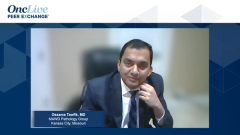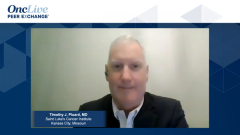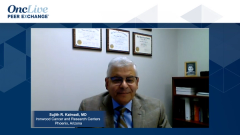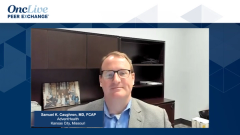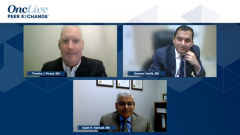
Improving Uptake of Biomarker Testing and Precision Medicine in Cancer Care
Key opinion leaders in the field of cancer management discuss resistance to the uptake of biomarker testing and precision medicine, with deference to the community setting.
Episodes in this series

Transcript:
Timothy J. Pluard, MD: Getting down to something a little more, perhaps, mundane, but I think very clinically relevant, particularly when you get into the community and community practices and community pathology groups, is that they may not be necessarily always sitting in the same room because the pathology may be sent out. I am just amazed at how we've come to our own problem, really, of generating the complexity of PD-L1 testing, where we have to use a different assay for a different tumor with different cut offs, like what's positive, what's not. Ossama, I suspect that that's probably a big headache in a pathology lab to make sure the right assay's being done and reported.
Ossama Tawfik, MD: I remember when the PD-L1 first came out, you guys came back from ASCO meetings, and I received a phone call from one of the oncologists and he was asking me about how we needed to do PD-L1 testing. I said, "What's PD-L1? I have no idea." So, I had to educate myself very quickly, and then work on finding who can do it, and then how to develop the test, and so on so forth. The rest is history, and it is still a very, very challenging part of the business. The information that trickles from experts and physicians in the field with the pathologists or oncologists can be challenging to get to the general pathologists or the general oncologists in community hospitals. We see that every day in our practice. With ordering NGS testing, we're still seeing individual tests being ordered. Sometimes, we're challenged if we request or try to order a comprehensive test, they say, "No, that's the way I practice, that's what I want to do." The same is true for pathologists that are knowledgeable enough, they might routinely do what they used to do a year or 2 ago and they did not change their practice. So, it is still very frustrating, and the statistics are staggering. It is a serious problem. I would say 50% of patients with cancer to this day are not getting what's available to them for one reason or the other.
Sujith R. Kalmadi, MD: Tim, I have a comment.
Timothy J. Pluard, MD:Yeah, sure, please.
Sujith R. Kalmadi, MD: I think that was a great example of the PD-L1 testing. It's quite fascinating for me to see how therapies have really guided how pathologists do the testing. The PD-L1 is one that Dr Tawfik said. The other one which comes to mind is hypomethylating agents. So, they got approved for MDS [myelodysplastic syndrome] several years ago, about 10 to 12 years ago. We had to go back to the pathologists and say, “Can you really look again and see if there is any component of MDS rather than just calling it as anemia?” If you look across the time, and if you look at the CR database, the incidents of MDS has just climbed up in the last 10 years. I don't think it's really that MDS has increased, it's that pathologists are recognizing it more because oncologists are putting pressure on them to say it is MDS because I now have a valid treatment available.
The next thing which comes to mind is about 4 years ago when I first saw the data with Enhertu in HER2-low breast cancers. One in 4 hospital systems, in fact probably the third or fourth largest system in Phoenix, was doing only HER2 by FISH without doing the HER2 by IHC, based on some CAP guidelines from the College of American Pathology. So, I went back to the pathologists at that particular hospital and said, “There's a new therapy which is evolving that is going to question how we treat these metastatic patients. Maybe we should start both IHC and FISH on all the patients.” It took a bit of resistance, but finally I think there's been an evolution and change in thinking and a change around [this]. But that's amazing how therapies are really dictating how we treat patients and how we test patients.
Timothy J. Pluard, MD:Yes, I agree, and I think another example of that, and I thought you were going to allude to this earlier, Ossama, when you talked about kind of going back to the future is with HER2-low. CtDNA doesn't help you because you really need IHC. So, if you're going to do it in a liquid biopsy, you really need to capture circulating tumor cells, which is really difficult. Now, we have to go back and figure out if we can use liquid biopsies to identify HER2-low patients who may benefit from trastuzumab deruxtecan.
Samuel K. Caughron, MD, FCAP: I'm not sure how often genomic test results are lost. I would say that's a rarity. However, how often are genomic test results not acted upon? That, unfortunately, is probably a very common event. I guess if you define lost as they don't make it back to the treating physician for integration into the decision-making about how a patient is going to be treated, then perhaps lost does happen more often.
I think the challenge with genomic testing is, well, there are multiple challenges that unfortunately result in patients not getting the full benefits that modern precision medicine has to offer. Results may be available, but they're not paired in well. There's a knowledge gap within the care team, about what implication those results have for the treatment options that that patient is eligible for. Perhaps there are misunderstandings about the individual results, and of the eligibility for individual patient results.
I think in many environments, economic factors come to play more than we recognize in deciding whether a patient even gets biomarker testing or genomic profiling. Then, if they do get it, whether or not they get the treatments that may be indicated based on the results of that testing. So, at the end of the day, the pathologists and oncologists being open and clear in educating one another on different aspects of the process, working together to continue to improve the process within their own environment as well as the way their environment interacts with other outside labs, for example, that interdisciplinary communication is probably the biggest tool we have to address and move patient care forward so that as many patients are getting the benefits of precision medicine.
Transcript edited for clarity.


